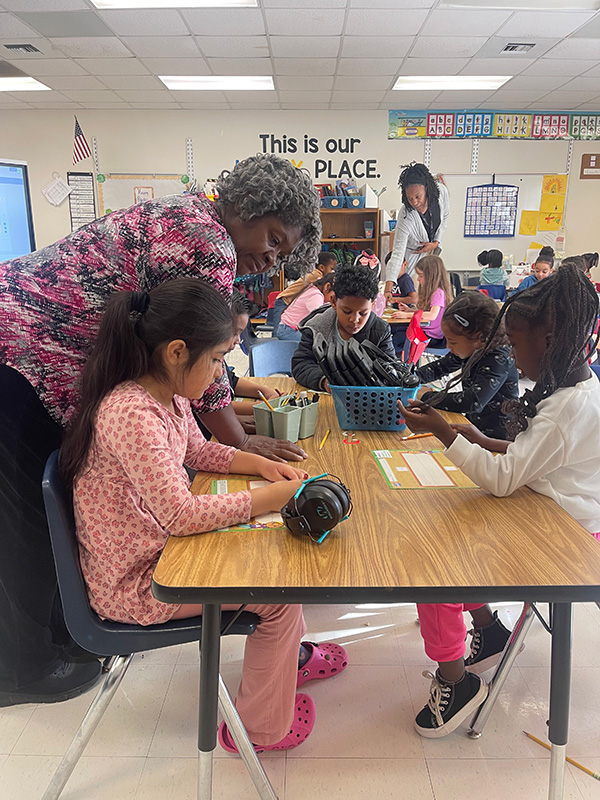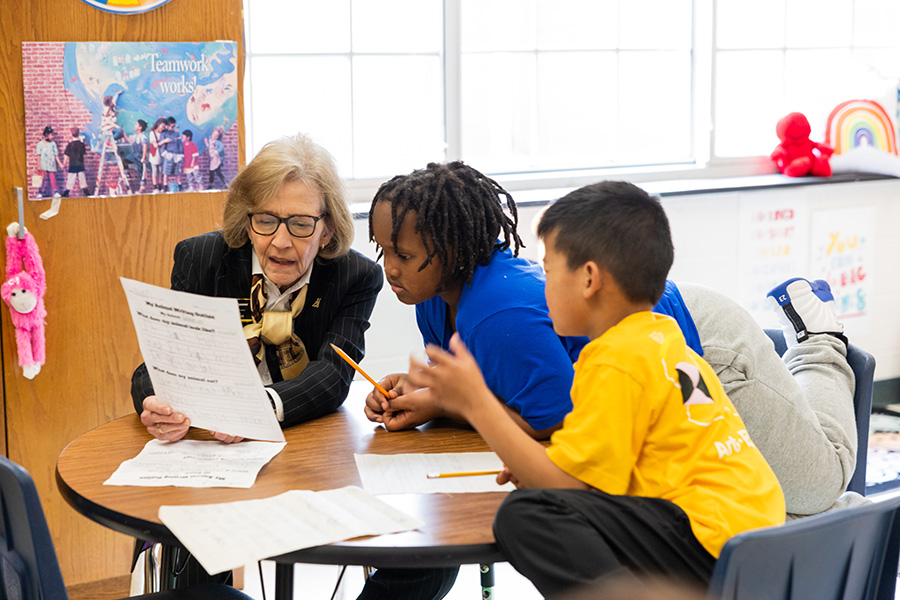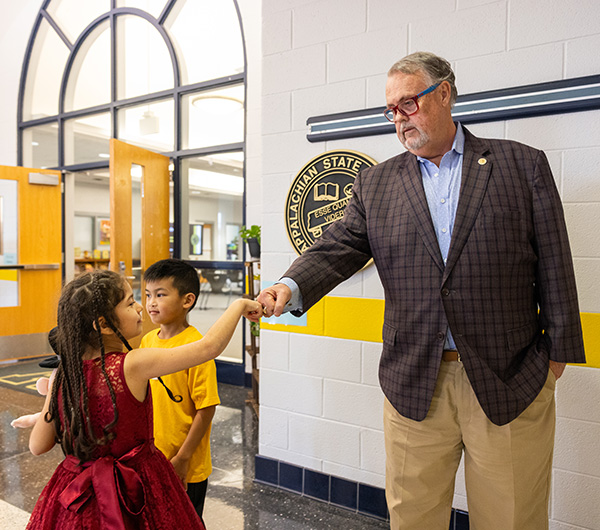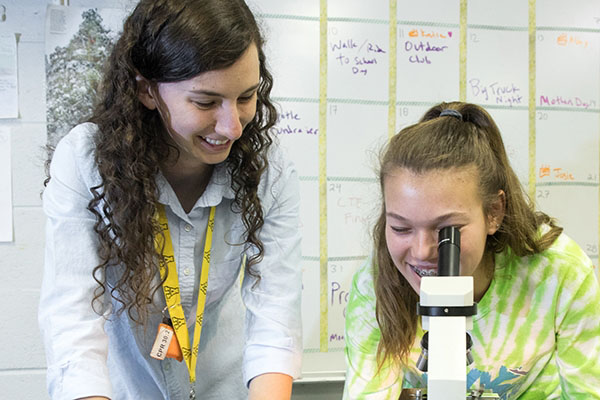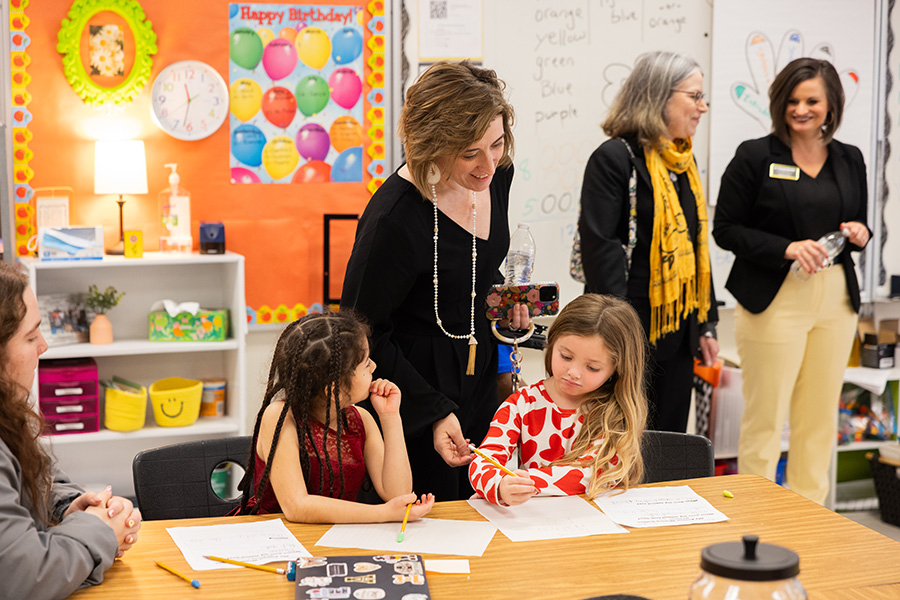
Dr. Amie Snow, principal of the Appalachian State University Academy at Middle Fork, center, works with first grade students Alexa and Remi on a small-group writing assignment. Pictured in the background, from left to right, are App State Chancellor Heather Norris and former Academy at Middle Fork Director Hannah Reeder. Photo by Chase Reynolds
WALKERTOWN, N.C. — When you picture a classroom, do you imagine one teacher managing 20 or more students? What if that traditional model could change?
That transformation is precisely what the Appalachian State University Academy at Middle Fork, a K–5 public elementary school in Forsyth County, has implemented with its strategic staffing model. Instead of a single teacher handling all responsibilities for one classroom for one grade, a collaborative team of academy educators supports student learning across two combined grade levels — such as kindergarten and first grades, or second and third grades.
Through this model, each grade span benefits from the expertise of a curriculum coach, an interventionist, four teachers, a teacher assistant, an academic tutor, as well as support from specialists in subject-specific areas, including STEM (science, technology, engineering and math).
“At the Academy at Middle Fork, we set out to address issues of isolation, burnout and overall working conditions for teachers,” said former Academy at Middle Fork Director Hannah Reeder. “When teachers are supported and confident, that makes the job more manageable, which directly impacts student learning and improves student outcomes.”
How the strategic staffing model works
The Academy at Middle Fork is one of seven free public laboratory schools operated by the University of North Carolina System. Established in 2016 by the North Carolina General Assembly, lab schools are tied to System institutions with strong educator preparation programs. Lab schools aim to improve student performance and provide high-quality teacher and principal training through innovative instructional programming, research and student support.
The Academy at Middle Fork began implementing its strategic staffing model in fall 2023, fostering co-teaching, co-planning and collaborative data analysis while engaging educators in ongoing professional learning.
A key component of this approach is restructuring the instructional week, with Fridays designated as Enrichment Days. This allows teachers to analyze student performance, plan future instruction and collaborate on interventions through co-planning, while students can focus on areas for which they may need more individualized attention, instruction or further exploration of subject areas.
“Our goal was not to hire more people but to reorganize our existing qualified staff,” said Joy Hickman, a second–third grade team teacher. “Ultimately, we wanted to foster student growth through a team approach.”
Teaching as a team
In a grade span model, teachers work together to support all students through project-based learning, small-group instruction and individualized interventions for reading and math. This structure allows teachers to learn from one another while leveraging individual strengths.
“Grade spans have allowed students to receive instruction tailored to their needs,” said RaChelle Wood, a kindergarten–first grade team teacher. “Teachers also gain professional growth opportunities by observing and learning from one another.”
“Teaching within this model, I feel less stress, because all of the weight of a teacher isn’t all on your shoulders,” said Alicia Kinzer, a second and third grade interventionist. “You have a team that supports you and all of the students.
“This model requires collaboration and a willingness to learn from one another,” Kinzer added.
Journey Barnes, an App State senior elementary education major from Denver, had an opportunity to complete her internship at the Academy at Middle Fork during the fall 2024 semester.
“During my internship, students seemed engaged in their learning because they knew what they were working toward, and they knew they had a plethora of teachers working with them,” she said.
Impact on student learning
Teachers at the Academy at Middle Fork have observed significant improvements in student engagement and academic performance.
“Students are more engaged and confident,” said Kinzer. “They’re comfortable making mistakes and learning from them, knowing they’re in groups with peers at similar levels.”
“Having multiple teachers allows for different instructional approaches, which keeps students engaged,” added Hickman.
Academy students have also noticed the benefits.
“Learning is different for us each day,” said fifth grade academy student Core. “We learn things using different types of strategies with a variety of teachers. We take tests on our level and then work to get better at those levels. We never do the same thing — it’s always a new way to learn.”
“In Learning Lab, our specialists come in and connect what we are learning in science and social studies and they teach with our teachers,” added Core.
“In reading and math workshops, we get a chance to work with lots of teachers and they help us in different ways. If I don’t understand it one way, there may be someone else who can help in another way,” said fifth grade student Monah.
Learning extends beyond traditional academics. “We take field trips to Boone and have special author visits,” shared fifth grader Kayden’Lee.
The model also emphasizes social-emotional learning.
“We talk about what happened and think about why it happened, and then work on things that we can change to make sure it doesn’t happen again,” said Monah. “We work things out and talk to one another.”
“We communicate with a lot of students, too,” added Monah. “We get to be around different people and learn together with people who are different from us. We have to work together. Our teachers help us learn how to work together and collaborate.”
All three students noted the benefits of having the same set of teachers for two consecutive years and agreed they feel better prepared for middle school because of the strategic staffing model.
Sharing the model with other educators
Recognizing the success of this model, leaders from the Reich College of Education and the Academy at Middle Fork have shared their approach at several conferences and forums, including:
- National Association for Co-Teaching
- Strategic School Staffing Virtual Summit
- North Carolina State Board of Education
- AIM (Accelerate, Invigorate and Motivate) Conference
- North Carolina School Board Association
- North Carolina Association of Colleges for Teacher Education
In fall 2024, Reich College Dean Melba Spooner was invited to testify to Congress at an Early Childhood, Elementary and Secondary Education Subcommittee hearing on “Innovative Teacher Preparation: Properly Equipping America’s Educators.” Spooner shared information about the college’s teacher preparation programs and the strategic staffing and workforce design efforts occurring at the lab school.
The hearing called for bold reforms to recruit new educators and ensure their long-term commitment to the teaching profession. U.S. Rep. Aaron Bean, chairman of the subcommittee at the time, praised App State for developing a model to support teacher retention.
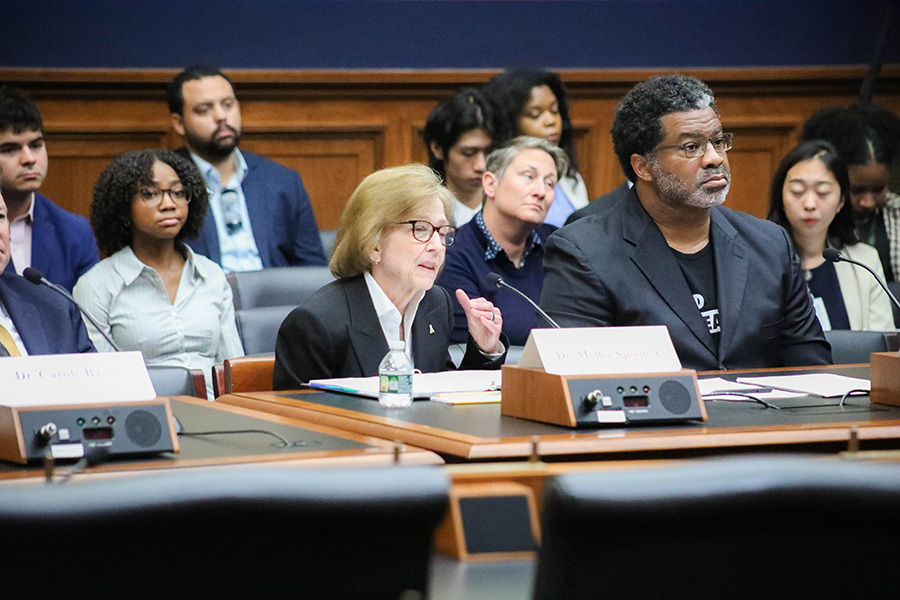
Dr. Melba Spooner, dean of App State’s Reich College of Education, center in foreground, provides testimony to Congress at the Early Childhood, Elementary, and Secondary Education Subcommittee hearing on “Innovative Teacher Preparation: Properly Equipping America’s Educators,” held Sept. 25, 2024. Spooner’s testimony focused on how App State prepares educators, as well as the strategic staffing and workforce design efforts taking place at the university’s lab school, the Appalachian State University Academy at Middle Fork in Walkertown. Photo courtesy of the Committee on Education and the Workforce, U.S. House of Representatives
“By reimagining the traditional model of one teacher-one classroom, new approaches can provide teachers and students room to flourish,” Bean said at the hearing. “It’s time to think boldly and spotlight changes that will not only bring more people into the teaching profession but will also ensure that they want to stay there.”
“As a lab school, we are tasked with innovative thinking,” said Reeder. “This model isn’t a temporary trend — it’s the future of education. We are proud to be at the forefront, serving as an example for others.”
For schools interested in adopting a similar approach, Reeder recommends starting small. “Visit our school, talk with our teachers and students and see the model in action,” she advised. “This is the future of teaching.”
For more information about the Academy at Middle Fork, including admissions information and open house dates, visit middlefork.appstate.edu.
What do you think?
Share your feedback on this story.
About the Academy at Middle Fork
The Appalachian State University Academy at Middle Fork, located in Walkertown, North Carolina, serves approximately 300 K–5 students. The academy provides a balanced education through the implementation of research-based practices, state-of-the-art literacy instruction, and exemplary classroom instruction and administration. Learn more at https://middlefork.appstate.edu.
About the Reich College of Education
Appalachian State University offers one of the largest undergraduate teacher preparation programs in North Carolina, graduating about 500 teachers a year. The Reich College of Education enrolls more than 2,000 students in its bachelor’s, master’s, education specialist and doctoral degree programs, with offerings that span multiple fields — from teacher preparation, counseling, and therapy, to higher education, school and student affairs administration, library science, educational leadership and more. With over 10,000 alumni employed in North Carolina public schools, there is at least one Reich College graduate in every county in the state. Learn more at https://rcoe.appstate.edu.
About Appalachian State University
As a premier public institution, Appalachian State University prepares students to lead purposeful lives. App State is one of 17 campuses in the University of North Carolina System, with a national reputation for innovative teaching and opening access to a high-quality, cost-effective education. The university enrolls more than 21,000 students, has a low student-to-faculty ratio and offers more than 150 undergraduate and 80 graduate majors at its Boone and Hickory campuses and through App State Online. Learn more at https://www.appstate.edu.

